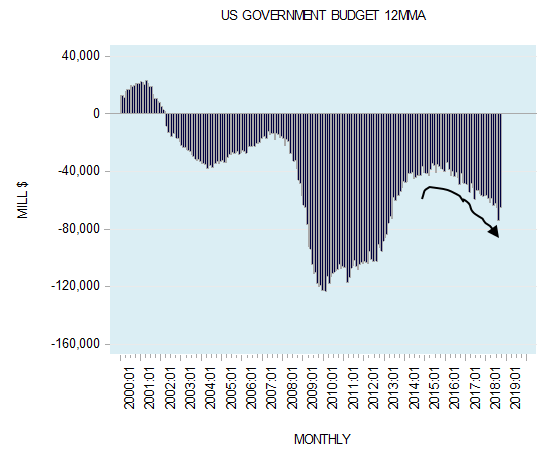On Monday, October 15, 2018, the US Treasury Department released figures showing that the federal budget deficit had widened by 17% in the 2018 fiscal year, to $779 billion.
Most experts see this widening in the deficit as the result of the tax cuts, which went into effect in January this year.
Note that the corporate tax rate was lowered from 35 percent to 21 percent while the income tax rate was reduced from 39.6 percent to 33 percent.
The 12-month moving average of the budget had a deficit of $64.9 billion in September against a deficit of $55.5 billion in September last year. In the chart below we can observe that the underlying budget deficit displays a visible widening.
Some commentators are of the view that in the midst of strong economic growth a widening in the budget deficit could be bad news once the economy falls into an economic slump. Hence, these commentators are of the view that the lowering of taxes was a wrong policy at this point in the economic cycle.
Some other commentators hold that the lowering of taxes is going to boost economic activity, which in turn is going to boost government revenues and thus shrink the budget deficit.
However for the time being the 12-month moving average of the annual growth rate of government revenue continues to display a visible decline (see chart).
The Budget deficit is not the key issue
The key focus should not be on the budget deficit as such but rather on government outlays: it is not possible to effectively lower taxes without a reduction in government outlays.
This is because the government as such is not a wealth-generating entity. In order to fund its activities, it has to take resources from the wealth-generating private sector. Various individuals employed by the government expect compensation for their work. The government can pay these individuals by taxing others who are still generating real wealth. By doing this, the government weakens the wealth-generating process and undermines prospects for genuine economic growth. (We ignore here borrowings from foreigners).














Leave A Comment